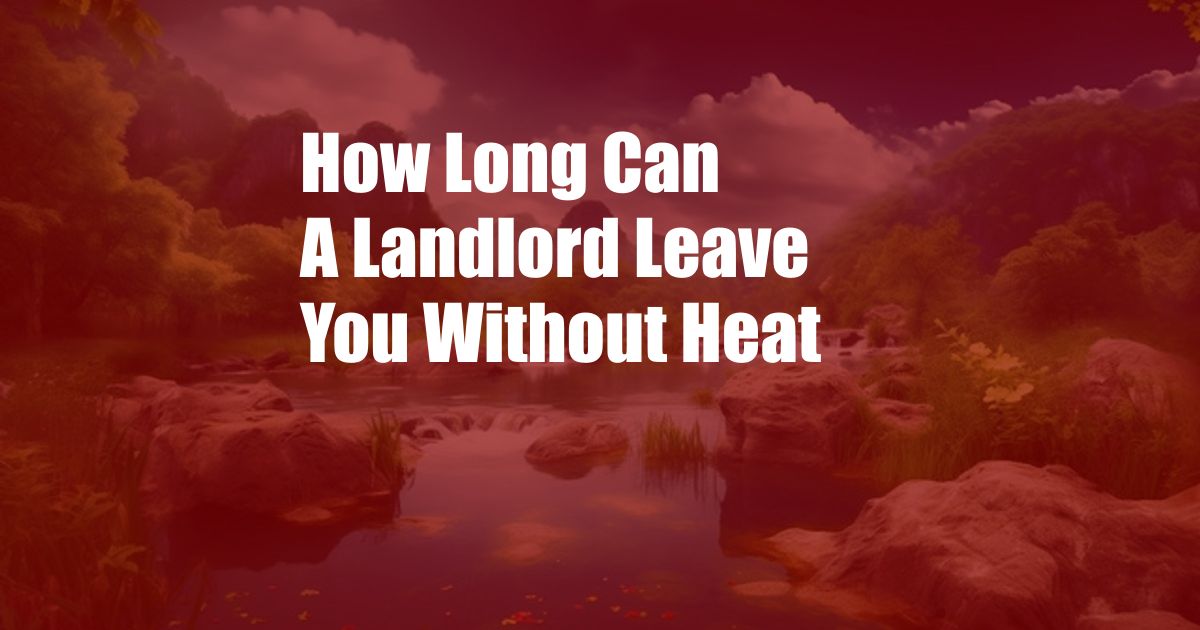
How Long Can a Landlord Leave You Without Heat?
Imagine waking up in the middle of a cold winter night, shivering uncontrollably. You realize that your apartment is freezing, and your landlord has failed to provide heat. You try to contact them, but they don’t respond. How long can they legally leave you without heat? The answer to this question depends on various factors, including the specific laws and regulations in your jurisdiction.
In most states, landlords are required to provide habitable living conditions for their tenants. This includes maintaining a reasonable temperature in the unit, especially during cold weather. The specific temperature requirements may vary from state to state, but generally, landlords must keep the temperature above a certain minimum level, typically around 68 degrees Fahrenheit. Failure to do so can result in legal consequences for the landlord.
Tenants’ Rights and Landlord Responsibilities
Tenants have the right to a habitable living space, which includes access to heat during cold weather. Landlords are responsible for ensuring that their properties meet these minimum standards. In cases where the landlord fails to provide heat, tenants may have several options:
- Contact the landlord and request that the heat be restored immediately.
- File a complaint with the local housing authority or relevant government agency.
- Withhold rent until the issue is resolved. (Note: This should only be done as a last resort and in accordance with local laws.)
- Pursue legal action against the landlord for breach of contract or negligence.
The specific legal remedies available to tenants may vary depending on the jurisdiction. It is always advisable for tenants to consult with an attorney or local housing authority for guidance on their rights and options.
Landlord’s Exemptions and Exceptions
In some cases, landlords may have valid reasons for not providing heat. For example, if there is a temporary outage due to a power failure or a boiler malfunction, the landlord may not be held liable if they are making reasonable efforts to restore the heat as soon as possible. Additionally, landlords may be exempt from providing heat in certain types of units, such as unheated storage spaces or garages.
It is important to note that landlords cannot simply refuse to provide heat without a valid reason. If you believe that your landlord is withholding heat illegally, you should not hesitate to report the issue to the appropriate authorities or seek legal advice.
Recent Trends and Developments
In recent years, there has been a growing focus on tenants’ rights and the habitability of rental units. Several states have enacted new laws or strengthened existing regulations to protect tenants from landlords who fail to provide adequate heat. For example, some states have established minimum temperature requirements that must be met at all times, regardless of the weather conditions.
Additionally, there has been an increase in legal actions against landlords who violate tenants’ rights. Tenants are becoming more aware of their rights and are more willing to pursue legal remedies when necessary. This has led to increased accountability for landlords and has helped to improve the overall quality of rental housing.
Tips and Expert Advice for Tenants
Here are some tips and expert advice for tenants who are experiencing issues with their landlord providing heat:
- Document all communication with your landlord regarding the lack of heat. Keep a record of phone calls, emails, and any other correspondence.
- Take photos or videos of the temperature in your unit using a reliable thermometer.
- Contact your local housing authority or relevant government agency to report the issue and request assistance.
- Consider withholding rent until the heat is restored. However, be sure to seek legal advice before taking this action.
- If necessary, pursue legal action against your landlord for breach of contract or negligence.
It is important to act quickly and assertively when your landlord fails to provide heat. By following these tips and seeking professional guidance when needed, you can protect your rights and ensure that you have a habitable living space.
Frequently Asked Questions (FAQs)
Q: How long can a landlord legally leave me without heat?
A: The specific time frame may vary depending on local laws and regulations. However, generally, landlords are required to provide heat within a reasonable amount of time after being notified of the issue.
Q: What should I do if my landlord refuses to provide heat?
A: Document all communication with your landlord and contact your local housing authority or relevant government agency to report the issue. You may also consider withholding rent or pursuing legal action.
Q: Are there any exceptions to the landlord’s obligation to provide heat?
A: Yes, there may be exceptions in cases of temporary outages or if the unit is not intended to be heated. However, landlords must have a valid reason for not providing heat.
Q: What are the penalties for landlords who fail to provide heat?
A: The penalties may vary depending on the jurisdiction. Landlords may face fines, legal action, or both for violating tenants’ rights.
Q: What can I do if I am experiencing health problems due to lack of heat?
A: Seek medical attention immediately and contact your local housing authority or relevant government agency to report the issue. You may also consider pursuing legal action against your landlord.
Conclusion
Landlords have a legal obligation to provide habitable living conditions for their tenants, including maintaining a reasonable temperature in the unit. Failure to do so can result in legal consequences. Tenants who are experiencing issues with their landlord providing heat should document the issue, contact the appropriate authorities, and seek professional guidance when necessary. By understanding your rights and taking action to protect them, you can ensure that you have a safe and comfortable place to live.
Are you interested in learning more about tenants’ rights and landlord responsibilities? Visit our website for additional resources and information.